13-1640
Hydrochloric acid
35.0-37.0%, JIS special grade
About This Item
Recommended Products
product name
Hydrochloric acid, JIS special grade, 35.0-37.0%
grade
JIS special grade
vapor density
1.3 (vs air)
vapor pressure
3.23 psi ( 21.1 °C)
7.93 psi ( 37.7 °C)
form
aqueous solution
availability
available only in Japan
concentration
35.0-37.0%
bp
>100 °C (lit.)
density
1.070 g/cm3 at 20 °C (lit.)
SMILES string
Cl
InChI
1S/ClH/h1H
InChI key
VEXZGXHMUGYJMC-UHFFFAOYSA-N
Looking for similar products? Visit Product Comparison Guide
Application
- Phosphoryl Trichloride-Method of Determination in Workplace Air.: This study focuses on the analytical determination of phosphoryl trichloride in workplace air using hydrochloric acid as a reagent. The method was validated and applied to assess the exposure of workers to this hazardous compound in industrial settings (Kowalska et al., 2023).
- Interference of Preservatives on Urinary Iodine Measurement by Sandell-Kolthoff Method.: This research examines the impact of preservatives, including hydrochloric acid, on the accuracy of urinary iodine measurements. The study highlights the need for careful selection of preservatives to avoid analytical interference (Kaya et al., 2022).
- Monitoring the Extraction of Copper from Chicken Dung Leachate Using an Aluminium Electrode as an Indicator.: The study explores the use of hydrochloric acid in the leaching process of copper from chicken dung. It demonstrates the effectiveness of hydrochloric acid in extracting metals from organic waste materials (Kugeria et al., 2019).
- Determination of Single-Ion Activities of H+ and Cl- in Aqueous Hydrochloric Acid Solutions by Use of an Ionic Liquid Salt Bridge.: The research provides a novel approach to determining the activities of hydrogen and chloride ions in hydrochloric acid solutions using an ionic liquid salt bridge, contributing to the understanding of ion behavior in aqueous solutions (Sakaida et al., 2011).
Signal Word
Danger
Hazard Statements
Precautionary Statements
Hazard Classifications
Eye Dam. 1 - Met. Corr. 1 - Skin Corr. 1B - STOT SE 3
Target Organs
Respiratory system
Storage Class Code
8B - Non-combustible corrosive hazardous materials
WGK
WGK 1
Flash Point(F)
Not applicable
Flash Point(C)
Not applicable
Regulatory Listings
Regulatory Listings are mainly provided for chemical products. Only limited information can be provided here for non-chemical products. No entry means none of the components are listed. It is the user’s obligation to ensure the safe and legal use of the product.
PDSCL
Deleterious substance
ISHL Indicated Name
Substances Subject to be Indicated Names
ISHL Notified Names
Substances Subject to be Notified Names
JAN Code
13-1640-7-4KG-J:
13-1640-5-500ML-J:
13-1640-8-23KG-J:
Certificates of Analysis (COA)
Search for Certificates of Analysis (COA) by entering the products Lot/Batch Number. Lot and Batch Numbers can be found on a product’s label following the words ‘Lot’ or ‘Batch’.
Already Own This Product?
Find documentation for the products that you have recently purchased in the Document Library.
Customers Also Viewed
Our team of scientists has experience in all areas of research including Life Science, Material Science, Chemical Synthesis, Chromatography, Analytical and many others.
Contact Technical Service















